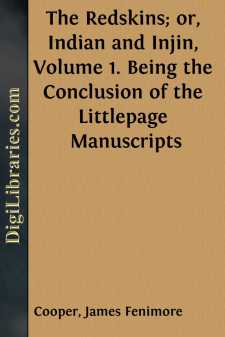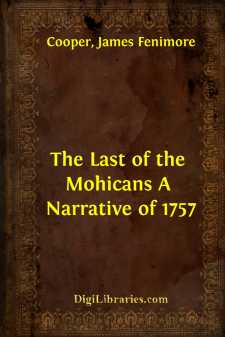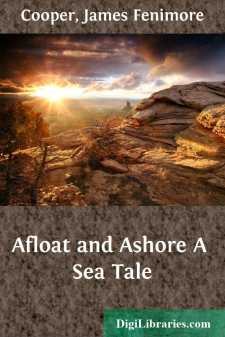Categories
- Antiques & Collectibles 13
- Architecture 36
- Art 48
- Bibles 22
- Biography & Autobiography 815
- Body, Mind & Spirit 144
- Business & Economics 28
- Children's Books 18
- Children's Fiction 14
- Computers 4
- Cooking 94
- Crafts & Hobbies 4
- Drama 346
- Education 58
- Family & Relationships 59
- Fiction 11833
- Games 19
- Gardening 17
- Health & Fitness 34
- History 1378
- House & Home 1
- Humor 147
- Juvenile Fiction 1873
- Juvenile Nonfiction 202
- Language Arts & Disciplines 89
- Law 16
- Literary Collections 686
- Literary Criticism 179
- Mathematics 13
- Medical 41
- Music 40
- Nature 179
- Non-Classifiable 1768
- Performing Arts 7
- Periodicals 1453
- Philosophy 65
- Photography 2
- Poetry 896
- Political Science 203
- Psychology 44
- Reference 154
- Religion 515
- Science 126
- Self-Help 85
- Social Science 82
- Sports & Recreation 34
- Study Aids 3
- Technology & Engineering 59
- Transportation 23
- Travel 463
- True Crime 29
James Fenimore Cooper
James Fenimore Cooper was a 19th-century American writer best known for his historical novels set on the American frontier. His most famous work, "The Last of the Mohicans," is part of the "Leatherstocking Tales" series, which follows the adventures of Natty Bumppo, a resourceful frontiersman. Cooper's writing significantly contributed to the development of American literature, highlighting themes of wilderness, native peoples, and the conflict between civilization and nature.
Author's Books:
Sort by:
PREFACE. This book closes the series of the Littlepage Manuscripts, which have been given to the world, as containing a fair account of the comparative sacrifices of time, money and labour, made respectively by the landlord and the tenants, on a New York estate; together with the manner in which usages and opinions are changing among us; as well as certain of the reasons of these changes. The...
more...
Chapter I."There is a pleasure in the pathless woods,There is a rapture on the lonely shore.There is society where none intrudes,By the deep sea, and music in its roar:I love not man the less, but nature more,From these our interviews, in which I stealFrom all I may be, or have been before,To mingle with the universe, and feelWhat I can ne'er express, yet cannot all conceal" Childe Harold....
more...
CHAPTER I. The turf shall be my fragrant shrine;My temple, Lord! that arch of thine;My censer's breath the mountain airs,And silent thoughts my only prayers.MOORE The sublimity connected with vastness is familiar to every eye. The most abstruse, the most far-reaching, perhaps the most chastened of the poet's thoughts, crowd on the imagination as he gazes into the depths of the illimitable...
more...
CHAPTER I. "Look you, Who comes here: a young man, and an old, in solemn talk." As You Like it. It is easy to foresee that this country is destined to undergo great and rapid changes. Those that more properly belong to history, history will doubtless attempt to record, and probably with the questionable veracity and prejudice that are apt to influence the labours of that particular muse;...
more...
PREFACE. * * * * * It is probable a true history of human events would show that a far larger proportion of our acts are the results of sudden impulses and accident, than of that reason of which we so much boast. However true, or false, this opinion may be in more important matters, it is certainly and strictly correct as relates to the conception and execution of this book. The Pilot was published in...
more...
"Mine ear is open, and my heart prepared:The worst is worldly loss thou canst unfold:Say, is my kingdom lost?" Shakespeare. It was a feature peculiar to the colonial wars of North America, that the toils and dangers of the wilderness were to be encountered before the adverse hosts could meet. A wide and apparently an impervious boundary of forests severed the possessions of the hostile...
more...
Chapter VI. O! It is great for our country to die, where ranks are contending;Bright is the wreath of our fame; Glory awaits us for aye--Glory, that never is dim, shining on with light never ending--Glory, that never shall fade, never, O! never away. Percival. Notwithstanding the startling intelligence that had so unexpectedly reached it, and the warm polemical conflict that had been carried on within...
more...
The writer has published so much truth which the world has insisted was fiction, and so much fiction which has been received as truth, that, in the present instance, he is resolved to say nothing on the subject. Each of his readers is at liberty to believe just as much, or as little, of the matter here laid before him, or her, as may suit his, or her notions, prejudices, knowledge of the world, or...
more...
It is a strong proof of the diffusive tendency of every thing in this country, that America never yet collected a fleet. Nothing is wanting to this display of power but the will. But a fleet requires only one commander, and a feeling is fast spreading in the country that we ought to be all commanders; unless the spirit of unconstitutional innovation, and usurpation, that is now so prevalent, at...
more...
JAMES FENIMORE COOPER "I believe I could write a better story myself!" With these words, since become famous, James Fenimore Cooper laid aside the English novel which he was reading aloud to his wife. A few days later he submitted several pages of manuscript for her approval, and then settled down to the task of making good his boast. In November, 1820, he gave the public a novel in two...
more...











